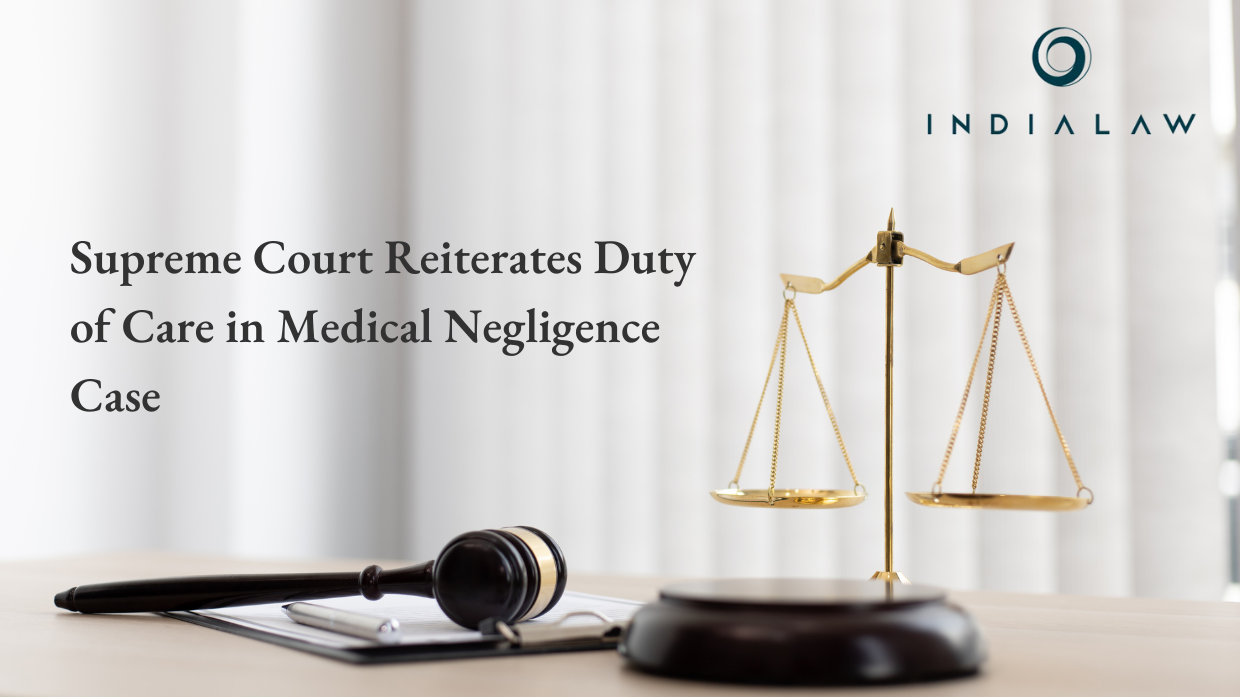Supreme Court Reiterates Duty of Care in Medical Negligence Case

This judgementi concerns a medical negligence case where a 13-year-old boy, Master Irshad, lost vision in his right eye following a cataract surgery performed by the respondents. The District Consumer Disputes Redressal Commission (“DCDRC”) initially ruled in favour of the appellant, but this decision was overturned by the West Bengal State Consumer Disputes Redressal Commission (“SCDRC”) and subsequently by the National Consumer Disputes Redressal Commission (“NCDRC”). The Division Benchii of the Supreme Court, upon reviewing the case, found that the SCDRC and NCDRC failed to properly consider the evidence, particularly expert testimony regarding lapses in pre-operative and post-operative care provided by the respondents.
The case revolves around a minor boy named Master Irshad who suffered an injury to his right eye. Following this injury, he was diagnosed with traumatic cataract and underwent surgery conducted by the respondents, who were doctors associated with Megha Eye Centre. However, post-surgery, Irshad experienced complications including irritation, pain, and blood clotting. Despite multiple visits to the doctors, his condition did not improve. A month later, Irshad and his father visited another medical institution, the Regional Institute of Ophthalmology (RIO), where they were informed that the surgery had resulted in a permanent loss of vision in the right eye due to retinal detachment.
The appellant, the Father of the boy a Below Poverty Line (BPL) card holder, filed a complaint under Section 12 of the Consumer Protection Act, 1986, alleging medical negligence on the part of the respondents. The DCDRC ruled in favour of the appellant, attributing negligence to the respondents and ordering compensation. However, the SCDRC and subsequently the NCDRC overturned this decision, citing a report from the West Bengal Medical Council (“Medical Council”) that exonerated the respondents and instead attributed contributory negligence on the part of the appellant for the delay caused in Irshad’s treatment.
The Supreme Court, upon reviewing the case, found that the SCDRC and NCDRC failed to adequately consider the evidence presented, particularly the expert testimony provided by Dr. Anindya Gupta, a medical expert from Burdwan Medical College. Dr. Gupta’s testimony highlighted significant lapses in both pre-operative and post-operative rehabilitation by the respondents, including the failure to conduct necessary tests, follow standard procedures, and provide appropriate follow-up care after surgery.
Despite the Medical Council’s report absolving the respondents, the Supreme Court noted that it did not address the specific issues of negligence raised by Dr. Gupta’s testimony. The Supreme Court criticized the SCDRC and NCDRC for relying solely on the Medical Report without properly considering contradictory evidence on record. It emphasized that the duty of care in medical practice extends beyond surgery and encompasses pre-operative and post-operative care, which the respondents were found lacking.
In light of these findings, the Supreme Court upheld the DCDRC’s decision, ruling in favour of the appellant and affirming the finding of the medical negligence against the respondents and held that the report of the Medical Council can be relevant for determining deficiency of service but it cannot be determinative. The Supreme Court directed the respondents to comply with the DCDRC’s order of compensation within one month from the date of its decision.
The Supreme Court’s decision underscores the importance of thorough consideration of evidence in cases of medical negligence and upholds the principle of accountability in medical practice. By overturning the decisions of the SCDRC and NCDRC and affirming the finding of negligence, the Supreme Court not only delivers justice to the aggrieved party but also sets a significant precedent for upholding medical standards and patient welfare. As such, this verdict serves not only as a beacon of justice for the appellant and their family but also as a guiding light for future legal proceedings and the broader advancement of medical ethics and patient rights.
i Judgment dated 22nd February, 2024, titled as Najrul Seikh V. Dr. Sumit Banerjee and Ors. (2024 LiveLaw (SC) 219)
ii The coram consisted of Vikram Nath and Satish Chandra Sharma, JJ.
By entering the email address you agree to our Privacy Policy.



